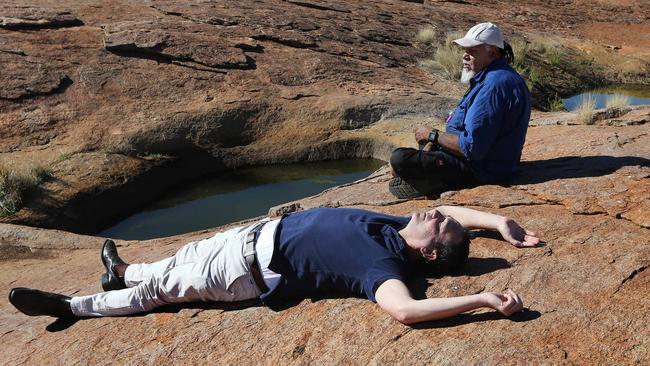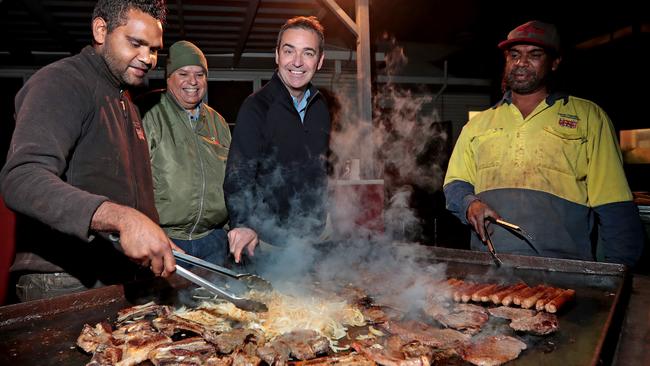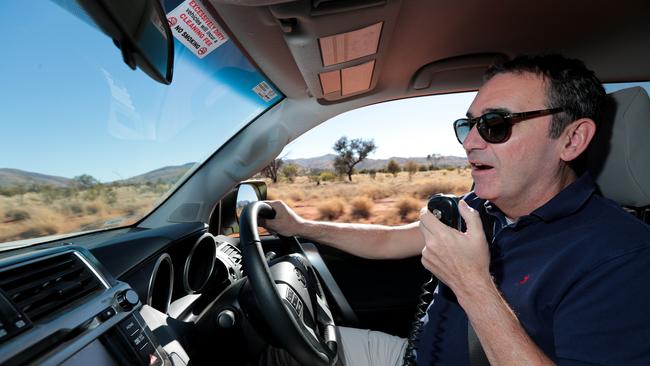Liberal leader Steven Marshall reveals his plans to help Aboriginal communities in the APY Lands
OPPOSITION Leader Steven Marshall has ruled out a treaty with Aboriginal communities in the Far North, calling it a “cruel hoax”.

SA News
Don't miss out on the headlines from SA News. Followed categories will be added to My News.
- Marshall finds new vision from the Outback
- Tjungkara Ken’s unique Archibald portrait
- State Government may take control of APY Lands corporation
- APY Lands community’s demands to Weatherill Cabinet
PLANS for Aboriginal treaties in South Australia are a “cruel hoax” that will not be supported by the Liberals, Opposition Leader Steven Marshall says.
In a move that will set the tone for how a Liberal Government would handle Aboriginal issues, Mr Marshall says symbolism will be scrapped and health, education, jobs and safety prioritised.
Speaking to the Sunday Mail during a three-day trip to the APY Lands last week, Mr Marshall said treaties were unworkable and not a priority for Aboriginal communities in South Australia.
“Treaties are a cruel hoax because they promise hope but don’t deliver practical outcomes,” he said.
“We have been here three days and nobody has raised the issue. The Anangu people want practical solutions and that is what we will be doing.

“The Government has neglected (health, education, jobs and safety) over the past 15 years while they have focused on gestures that are not practical for Aboriginal people across South Australia.”
Aboriginal Affairs Minister Kyam Maher last year announced the State Government would begin treaty discussions with Aboriginal South Australians as the next step towards reconciliation.
But Mr Marshall, who has vowed to become the first SA Premier to hold the Aboriginal Affairs portfolio if elected in March, said the Liberals will not support Labor’s treaty plan.
“Federal Labor governments from Hawke to Keating to Rudd and Gillard have talked about a treaty for 30 years,” he said.
“The problem on the APY Lands is there have been too many groups trying to provide solutions on complex issues but these are being done without any useful co-ordination whatsoever.”
Mr Marshall knows his attitude will be criticised by some in the Aboriginal community, which has previously supported the State Government’s treaty plans.

“Labor have done a lot more of the symbolic recognitions. The Liberals, by contrast, have proved to be very practical in terms of management of Aboriginal Affairs,” he said.
Mr Marshall said his Stolen Generation Bill, which was knocked back by Labor in 2014 before being reintroduced by the State Government in another form, showed his commitment to good outcomes for Aboriginal people.
Under Mr Marshall’s plan, about 300 Aboriginals would have been awarded $50,000 compensation in-line with the maximum amount payable from the Victims of Crime fund.
“The South Australian Government has still not paid a single cent to the people,” he said.
The State Government has set aside $4.4 million over five years to support the treaty process, the appointment of an independent Treaty Commissioner and governance training and support for Aboriginal nations to participate in the treaty negotiations.
Legislation underpinning Labor’s treaty plans are set to be debated in State Parliament in coming weeks.


